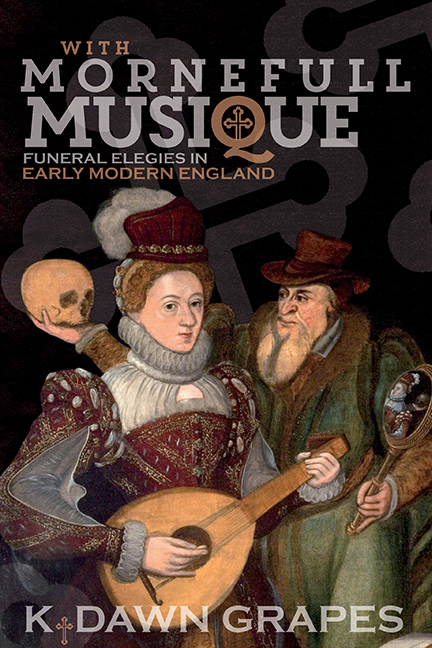 With Mornefull Musique: Funeral Elegies in Early Modern England
With Mornefull Musique: Funeral Elegies in Early Modern England Book contents
- Frontmatter
- Contents
- List of Figures
- List of Music Examples
- Acknowledgements
- Editorial Conventions
- Introduction
- 1 “With Mornefull Musique”: The English Musical Funeral Elegy
- 2 “The Floure of England”: The Earliest Musical Elegies for Sir Philip Sidney
- 3 “Of Griefe and Honour Still”: Elizabethan Courtiers
- 4 “Say Death Hath Lost”: Knights of the Realm
- 5 “Weepe Forth Your Teares”: Laments for a Lost King
- 6 “A Flower of Beutye”: The Feminine Legacy of Queens and Matriarchs
- 7 “For Death of Her”: The Unusual Case of Mary Gascoigne
- 8 “And Music Dies ...”: Musicians and their Stories
- Epilogue
- Appendix: Recordings List
- Select Bibliography
- Index
- Titles listed here were originally published under the series title Music in Britain, 1600–1900
- New titles published under the series title Music in Britain, 1600–2000
4 - “Say Death Hath Lost”: Knights of the Realm
Published online by Cambridge University Press: 17 October 2019
- Frontmatter
- Contents
- List of Figures
- List of Music Examples
- Acknowledgements
- Editorial Conventions
- Introduction
- 1 “With Mornefull Musique”: The English Musical Funeral Elegy
- 2 “The Floure of England”: The Earliest Musical Elegies for Sir Philip Sidney
- 3 “Of Griefe and Honour Still”: Elizabethan Courtiers
- 4 “Say Death Hath Lost”: Knights of the Realm
- 5 “Weepe Forth Your Teares”: Laments for a Lost King
- 6 “A Flower of Beutye”: The Feminine Legacy of Queens and Matriarchs
- 7 “For Death of Her”: The Unusual Case of Mary Gascoigne
- 8 “And Music Dies ...”: Musicians and their Stories
- Epilogue
- Appendix: Recordings List
- Select Bibliography
- Index
- Titles listed here were originally published under the series title Music in Britain, 1600–1900
- New titles published under the series title Music in Britain, 1600–2000
Summary
FROM the distance of hundreds of years, to be a knight in the service of Queen Elizabeth seems like a wildly romantic notion. Many honorary knights served as courtiers for the queen, helping to perpetuate the sophisticated culture surrounding Elizabethan legend. Yet in practical terms, those who took on more conventional knightly duties, fighting bodily for queen and country, often led lives requiring much time away from home and personal interests. This cost of service often led to the relinquishment of substantial portions of personal fortunes and sometimes steered dedicated countrymen into mortal danger. In spite of England's geographical position on an “isolated” island, over the course of Elizabeth's reign, ongoing conflicts in five areas necessitated military action. Skirmishes over disputed border territories in Scotland and France, naval action with Spain, support of Protestant resistance in the Low Countries, and the suppression of rebellion forces in Ireland all required extensive human, physical, and financial resources. Traditionally, leadership for defense of country was found within the order of knighthood. Many peers received the honor, but, since the title was bestowed individually, there was no certainty one would become a knight simply because of noble heritage. Not all knights were soldiers, and certainly not all soldiers became knights, but noted bravery and leadership on the battlefield was one path to knighthood, the bestowing of which was used as a morale boost for those who provided service to country and fellow man. Such an honor might aid when bidding for court recognition. A large number of the honorees of musical funerary tributes were knights, including all of the courtiers examined in chapters 2 and 3. Three other noted soldiers for whom musical elegies were composed followed in the mold of Sidney and Essex. Thomas Lord Burgh, Sir John Shelton, and Sir Charles Blount (Lord Mountjoy and eventually Earl of Devonshire) each served militarily in multiple locations, had close ties to the Earl of Essex, and were especially important in action in Ireland. Burgh and Shelton lost their lives there.
- Type
- Chapter
- Information
- With Mornefull Musique: Funeral Elegies in Early Modern EnglandFuneral Elegies in Early Modern England, pp. 91 - 120Publisher: Boydell & BrewerPrint publication year: 2018
